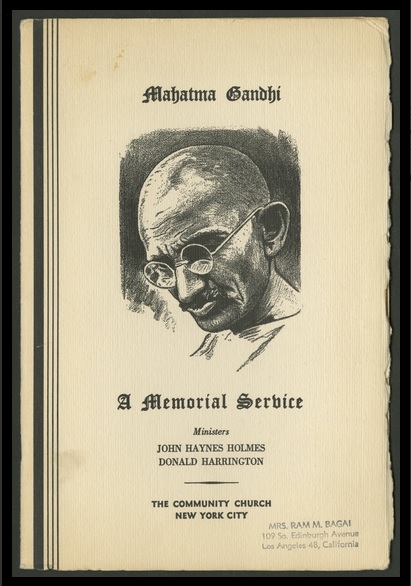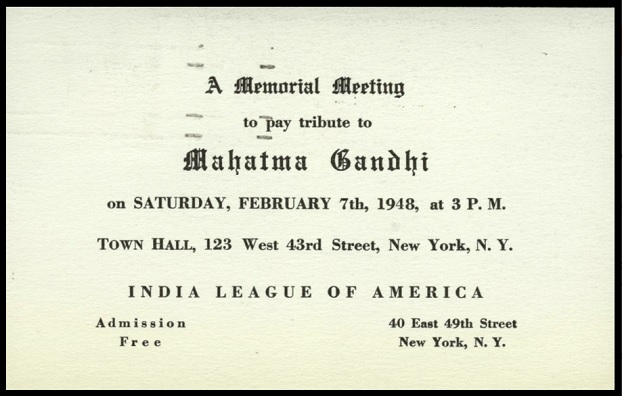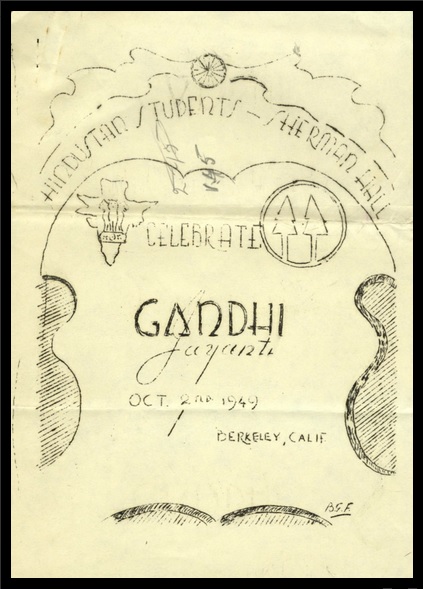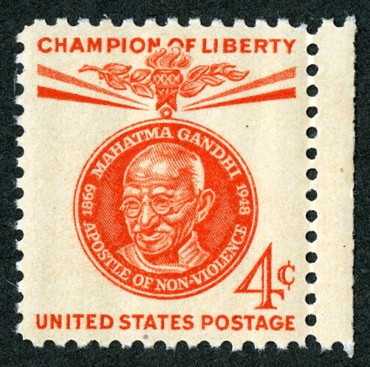The following piece is part of The Aerogram’s collaboration with the South Asian American Digital Archive (SAADA), which documents and shares the history of South Asian Americans.
* * *
To celebrate the 150th anniversary of Mahatma Gandhi’s birth on Oct. 2, 1869, the Indian government began a two-year celebration this month that will continue into 2019 — the 150th-anniversary year — and 2020.
Gandhi was admired by many people worldwide during his life (he was nominated for the Nobel Peace Prize five times), and after he was assassinated on Jan. 30, 1948, the nonviolent leader of India’s independence movement was mourned across the globe.
Several documents in the South Asian American Digital Archive attest to how Gandhi’s death was marked in the United States. A mere two days after he died, a memorial service was held at the Community Church of New York, and more than 1,700 mourners attended, according to a booklet documenting the event’s speakers. The service included a reading from the Bhagavad Gita and an address about Gandhi’s life by John Haynes Holmes, a Unitarian minister and a co-founder of the ACLU and NAACP.

In his speech, Holmes predicted that Gandhi would have a lasting influence on the world just as Jesus had:
For as Jesus came to his own only after the fell moment of this death and has lived serene and potent in the hearts of unnumbered millions to our own time, so Gandhi will live and assert his magic influence upon the souls and hearts of men forever.
The India League of America, which supported India’s struggle for independence, held a memorial meeting on Feb. 7, 1948, in New York City, and according to a report on the gathering, more than 1,200 people of “different nationalities, races and creeds” attended. Twenty people spoke, including Rep. Emanuel Celler, NAACP Executive Secretary Walter White, and several countries’ representatives to the U.N. Security Council. White said:
There is a significance for the peoples and the nations of the world who have gone mad during recent generations over theories of racial superiority, that it was a slender brown man in far-off India who has become the greatest moral and spiritual leader of the world since the days of Jesus Christ.

The report on the memorial meeting also contains statements from several prominent individuals of the time who were unable to attend. Among messages from the likes of Eleanor Roosevelt, New York City Mayor William O’Dwyer, ACLU Director Roger Baldwin, and Nobel Prize-winning author Pearl S. Buck is a statement from Albert Einstein, who was a member of the India League’s National Advisory Board. In his message, Einstein said of Gandhi:
He has demonstrated that a powerful human following can be assembled not only through the cunning game of the usual political manoeuvers and trickeries but through the cogent example of a morally superior conduct of life.
The following year, on what would have been Gandhi’s 80th birthday, the Hindustan Students’ Association of America in Berkeley, California, held a celebration at Berkeley High School. According to the program booklet, passages from the Bhagavad Gita, Quran, and Bible were read, followed by the singing of one of Gandhi’s favorite bhajans, “Raghupati Raghava Raja Ram.”

Since the late 1940s, Gandhi and his message of nonviolence have been commemorated throughout the world. In 1961, the United States became the second country, after India, to issue a Gandhi postage stamp. The stamp hailed him an “apostle of non-violence” and “champion of liberty.” Many cities worldwide have Gandhi streets, and all over the United States Gandhi statues have been installed.

Of course, more recently the image of Gandhi has expanded as scholars and activists have highlighted his earlier attitudes about black people while living in South Africa and his “experiments” to test his celibacy. Currently, activists in Malawi are protesting a statue of Gandhi. As with many heroes of the past, Gandhi was not perfect in all areas of his life, and he sometimes falls short if judged against what’s considered progressive today.
Nonetheless, Gandhi is widely hailed for his insistence on nonviolence and his leadership of India’s independence movement. These legacies have inspired millions of people worldwide to push for a world with more peace and justice, and these ideals are what are being celebrated during the two years of commemorations to mark the 150th anniversary of Gandhi’s birth.
* * *
Preeti Aroon (@pjaroonfp) is a Washington, D.C.–based copy editor at National Geographic and was formerly copy chief at Foreign Policy.












